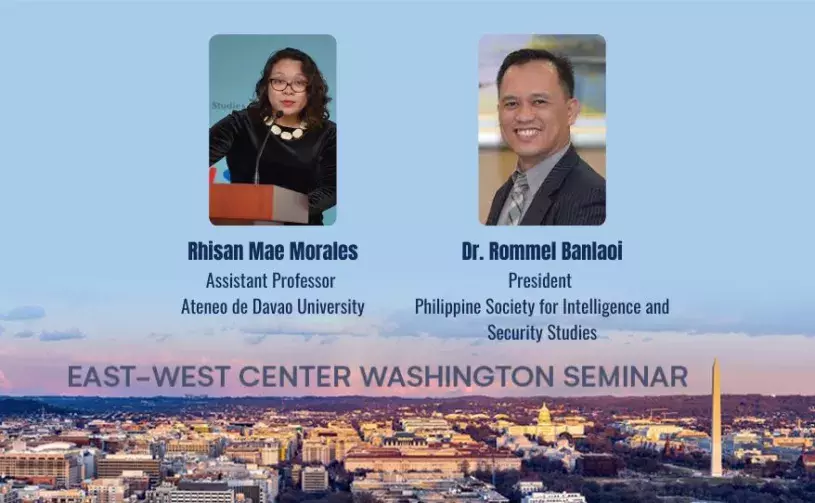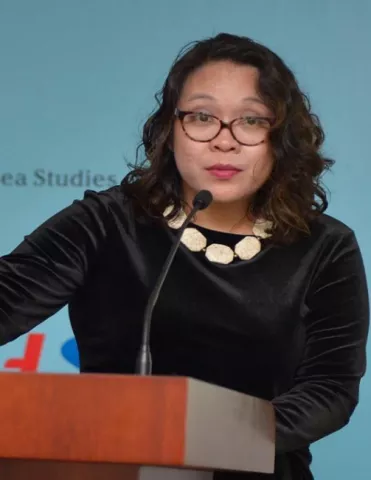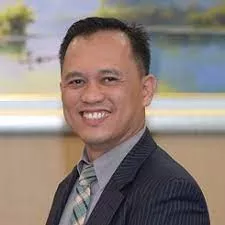Error message

OFFICE/DEPARTMENT
The East-West Center in Washington invites you to an
Indo-Pacific Foreign Policy and Defense Series Seminar:
New War in the South China Sea: Framing China's Unrestricted Warfare and
the Role of the US Indo-Pacific Strategy
A Conversation With:
Rhisan Mae Morales
Assistant Professor
Ateneo de Davao University
Dr. Rommel Banlaoi
President
Philippine Society for Intelligence and Security Studies
Dr. Satu Limaye (Moderator)
Vice President, East-West Center &
Director, Research Program and East-West Center in Washington
The Chinese strategy of unrestricted warfare—combining civilian and non-military units with its military force into a maritime network operation supporting its naval dominance in the South China Sea—has set various implications for international and domestic laws. Unrestricted warfare operates in times of peace and war, thus challenging maritime enforcement policies and legal mechanisms supported by international law. China’s network of militias and military units resulted in the emergence of new war in the South China Sea and the entire Indo-Pacific region. The United States, through its Indo-Pacific strategy, aims to protect the freedom of navigation and the rule of law by strengthening its network of allies in the region. With China’s unrestricted warfare strategy, how will US Indo-Pacific Strategy address the threats of new war in the South China Sea?

Rhisan Mae E. Morales earned her bachelor’s degree in International Studies Major in Asian Studies Minor in Philosophy from the Ateneo de Davao University. She obtained her Master of Arts in International Studies from Miriam College in 2015. Ms. Morales was selected by the National Institute for South China Sea Studies (NISCSS) to attend the 3rd China-ASEAN Academy on Ocean Law and Governance in Hainan, China. She was also a participant to the Kautilya Fellows Program in New Delhi, India.
Ms. Morales serves as Director for the Ateneo Center for Politics and International Affairs (CPIA). She is a member of the Board of Directors of the Asian Studies Association of the Philippines (Asia-Phil) Foundation from July 2017 to present. She is also a member of the Philippine Association for Chinese Studies (PACS) and the International Studies Association (ISA).

Dr. Rommel Banlaoi is the President of the Philippine Society for Intelligence and Security Studies (PSISS) formed under auspices of the Philippine Institute for Peace, Violence and Terrorism Research (PIPVTR) where he sits as the Chairman of the Board. He served as a Professorial Lecturer at the International Studies Department of Miriam College, Professor of Political Science at the National Defense College of the Philippines (NDCP), Assistant Professor of International Studies at De La Salle University (DLSU), Instructor in Political Science at the University of the Philippines Los Banos (UPLB) and University Research Associate at the University of the Philippines Diliman (UPD). He was also an Adjunct Professor at the National Institute for South China Sea Studies (NISCSS), Fellow of the Asia Pacific Center for Security Studies (APCSS), President of the Philippine Association for Chinese Studies (PACS), and a member of the Management Board of the World Association for Chinese Studies (WACS).
He is currently a member of the Board of Directors of the China-Southeast Asia Research Center on the South China Sea (CSARC) while serving as a member of the International Panel of Experts of the Maritime Awareness Project (MAP) of the National Bureau of Asian Research (NBR) and the Sasakawa Peace Foundation (SPF). He is also the Vice Chairman for External Affairs of the Advisory Council of Criminal Investigation and Detection Group (CIDG) of the Philippine National Police (PNP) and Vice Chairman for Internal Affairs of the Advisory Group of the PNP Drugs Enforcement Group (PDEG). In July 2022, he was designated/nominated as a Deputy National Security Adviser but he has resumed his work as an independent security analyst. He finished his BA and MA in Political Science at UPD and earned his PhD in International Relations at Jinan University in Guangzhou, China.

Dr. Satu P. Limaye is Vice President of the East-West Center and Director of Research, East-West Center in Washington, and interim director of the Professional Development Program. He created and directs the Asia Matters for America initiative and is the founding editor of the Asia Pacific Bulletin. He is also a Senior Advisor at CNA Corp (Center for Naval Analyses). He is a graduate of Georgetown University and received his doctorate from Oxford University (Magdalen College) where he was a George C. Marshall Scholar.
He publishes and speaks on Indo-Pacific regional issues and supports various US government, foundation, fellowship, and professional organizations. He recently served on the Center for New American Security (CNAS) Task Force on the US-Philippines Alliance, United States Institute of Peace (USIP) Senior Study Group on the North Pacific, Project 2049 Study Group on the US-Australia Alliance, and Global Taiwan Institute-Taiwan Asia Exchange Foundation project on Taiwan’s New Southbound Policy. He serves on the Korea Economic Institute (KEI) Advisory Council and editorial board of East Asian Policy and regional editor of Global Asia.
The East-West Center in Washington invites you to an
Indo-Pacific Foreign Policy and Defense Series Seminar:
New War in the South China Sea: Framing China's Unrestricted Warfare and
the Role of the US Indo-Pacific Strategy
A Conversation With:
Rhisan Mae Morales
Assistant Professor
Ateneo de Davao University
Dr. Rommel Banlaoi
President
Philippine Society for Intelligence and Security Studies
Dr. Satu Limaye (Moderator)
Vice President, East-West Center &
Director, Research Program and East-West Center in Washington
The Chinese strategy of unrestricted warfare—combining civilian and non-military units with its military force into a maritime network operation supporting its naval dominance in the South China Sea—has set various implications for international and domestic laws. Unrestricted warfare operates in times of peace and war, thus challenging maritime enforcement policies and legal mechanisms supported by international law. China’s network of militias and military units resulted in the emergence of new war in the South China Sea and the entire Indo-Pacific region. The United States, through its Indo-Pacific strategy, aims to protect the freedom of navigation and the rule of law by strengthening its network of allies in the region. With China’s unrestricted warfare strategy, how will US Indo-Pacific Strategy address the threats of new war in the South China Sea?

Rhisan Mae E. Morales earned her bachelor’s degree in International Studies Major in Asian Studies Minor in Philosophy from the Ateneo de Davao University. She obtained her Master of Arts in International Studies from Miriam College in 2015. Ms. Morales was selected by the National Institute for South China Sea Studies (NISCSS) to attend the 3rd China-ASEAN Academy on Ocean Law and Governance in Hainan, China. She was also a participant to the Kautilya Fellows Program in New Delhi, India.
Ms. Morales serves as Director for the Ateneo Center for Politics and International Affairs (CPIA). She is a member of the Board of Directors of the Asian Studies Association of the Philippines (Asia-Phil) Foundation from July 2017 to present. She is also a member of the Philippine Association for Chinese Studies (PACS) and the International Studies Association (ISA).

Dr. Rommel Banlaoi is the President of the Philippine Society for Intelligence and Security Studies (PSISS) formed under auspices of the Philippine Institute for Peace, Violence and Terrorism Research (PIPVTR) where he sits as the Chairman of the Board. He served as a Professorial Lecturer at the International Studies Department of Miriam College, Professor of Political Science at the National Defense College of the Philippines (NDCP), Assistant Professor of International Studies at De La Salle University (DLSU), Instructor in Political Science at the University of the Philippines Los Banos (UPLB) and University Research Associate at the University of the Philippines Diliman (UPD). He was also an Adjunct Professor at the National Institute for South China Sea Studies (NISCSS), Fellow of the Asia Pacific Center for Security Studies (APCSS), President of the Philippine Association for Chinese Studies (PACS), and a member of the Management Board of the World Association for Chinese Studies (WACS).
He is currently a member of the Board of Directors of the China-Southeast Asia Research Center on the South China Sea (CSARC) while serving as a member of the International Panel of Experts of the Maritime Awareness Project (MAP) of the National Bureau of Asian Research (NBR) and the Sasakawa Peace Foundation (SPF). He is also the Vice Chairman for External Affairs of the Advisory Council of Criminal Investigation and Detection Group (CIDG) of the Philippine National Police (PNP) and Vice Chairman for Internal Affairs of the Advisory Group of the PNP Drugs Enforcement Group (PDEG). In July 2022, he was designated/nominated as a Deputy National Security Adviser but he has resumed his work as an independent security analyst. He finished his BA and MA in Political Science at UPD and earned his PhD in International Relations at Jinan University in Guangzhou, China.

Dr. Satu P. Limaye is Vice President of the East-West Center and Director of Research, East-West Center in Washington, and interim director of the Professional Development Program. He created and directs the Asia Matters for America initiative and is the founding editor of the Asia Pacific Bulletin. He is also a Senior Advisor at CNA Corp (Center for Naval Analyses). He is a graduate of Georgetown University and received his doctorate from Oxford University (Magdalen College) where he was a George C. Marshall Scholar.
He publishes and speaks on Indo-Pacific regional issues and supports various US government, foundation, fellowship, and professional organizations. He recently served on the Center for New American Security (CNAS) Task Force on the US-Philippines Alliance, United States Institute of Peace (USIP) Senior Study Group on the North Pacific, Project 2049 Study Group on the US-Australia Alliance, and Global Taiwan Institute-Taiwan Asia Exchange Foundation project on Taiwan’s New Southbound Policy. He serves on the Korea Economic Institute (KEI) Advisory Council and editorial board of East Asian Policy and regional editor of Global Asia.













